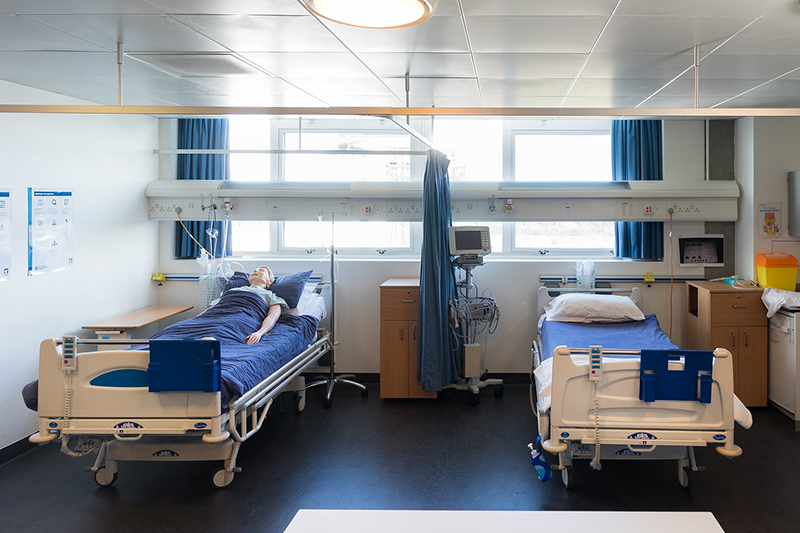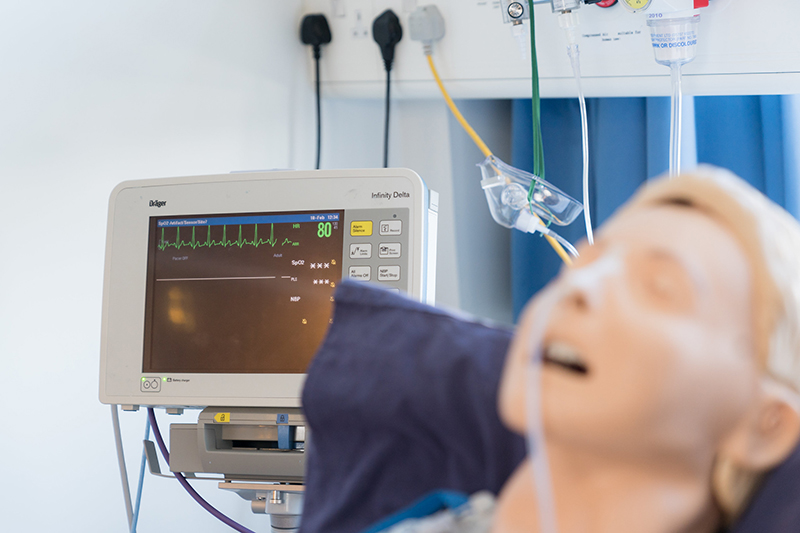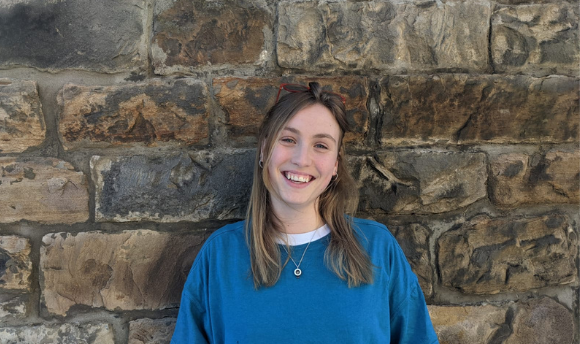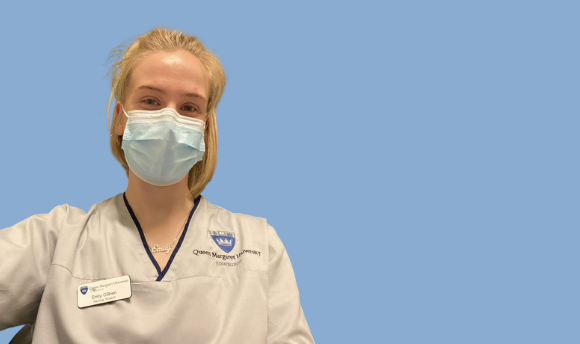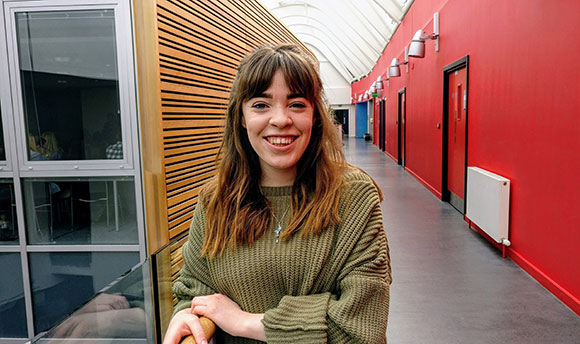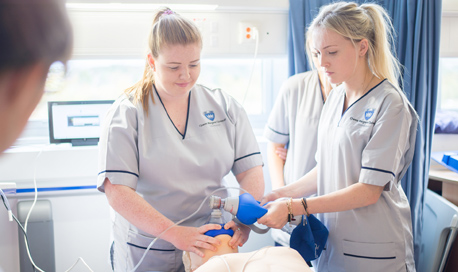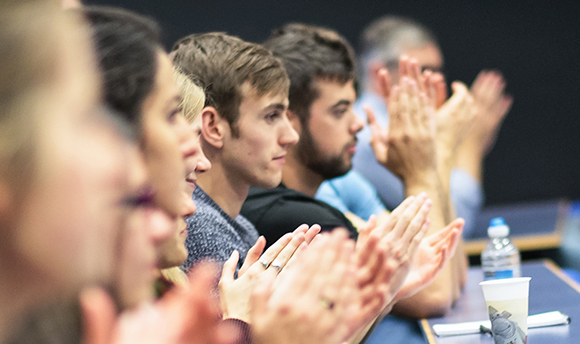94.4% overall student satisfaction in National Student Survey placing us 2nd in UK for 'Adult Nursing' (NSS 2021).
Master of Nursing (MNurse)
This is a new four-year integrated master’s degree in nursing, with the option to exit with a BSc (Hons) Nursing. The course will prepare you with the knowledge, skills and leadership qualities for a successful and rewarding career in nursing.
Nursing demands compassion and skill and this course will fully equip you to give exceptional person-centred care. With this degree course you will be able to register with the NMC and practise as a nurse.

Why QMU?
- Your theoretical learning will be complemented with practice in our Clinical Simulation Suite and in a variety of health and social care settings.
- Small classes mean you will benefit from individual support from our highly experienced course team.
- We are ranked top in Scotland and joint top in the UK for student satisfaction in Nursing in the National Student Survey 2020.
About the course
As a nurse, you will be at the forefront of healthcare, meeting a broad range of people who truly need your expertise and empathy. Nurses are involved in promoting health and preventing illness in addition to caring for sick and dying people. This can take place in a variety of environments, which include health centres, homes, residential/care homes and hospitals. A career in nursing can take you into leadership and management, education and research, at home and overseas. Wherever you choose to specialise in the future, as a nurse you will be an advocate for the people in your care. You will make a difference.
This course will prepare you to confidently deliver safe, effective and person-centred nursing care. It will offer you the chance to be part of a community of learners, working collaboratively with lecturers, clinical staff, service users and other students on a transformational journey towards registration. You will actively engage in creative and critical ways of working and learning including approaches such as critical inquiry, reflection, contemplation, simulation and practice learning experiences.
Year One: Knowing self and others. This year focuses on the foundations of professional nursing care. You will explore a range of influences on health, professional issues, skills for nursing practice, and the bio-sciences to inform person-centred care. You will focus on the healthy person and healthy communities. Students will start to develop research and academic enquiry skills in Year One and these are embedded throughout the programme.You will begin to learn to meet the needs of people across the lifespan and what the key health challenges may be nationally and internationally. We focus on supporting and facilitating your own self-care, incorporating contemplative learning approaches. Clinical skills learning will prepare you for practice learning experiences in a variety of settings.
Year Two: Knowing self, others and society. You will build on learning from Year One and learn how to plan and evaluate care in a person-centred way. The year focuses on facilitating and supporting health and self-care in persons/family/carers. You will learn how to assess and care for people as they cope and adapt to ill health, combining science subjects with nursing care. Clinical skills learning will prepare you for practice learning experiences in a variety of settings.
Year Three: Knowing how to develop self and others. Year Three concentrates on the care of people with complex needs and increasing dependency in a range of settings. Making person-centred judgements and decisions will be a focus. Leadership skills will be further developed and the promotion of person-centred cultures in care environments. You will explore healthcare governance and research evidence relating to effective, compassionate nursing practice. Further clinical skills learning will prepare you for practice learning experiences in a variety of settings and you will develop knowledge of the integration of health and social care through engagement with the voluntary sector.
Year Four: Focuses on integrating previous learning to enable you to graduate as a registered nurse with advanced skills. There will be completion of a portfolio and development of research themes related to current healthcare priorities to support development of a dissertation/ final project. Final year skills work will involve more advanced assessment and practice learning experiences. This will prepare you for registration and include preparation for prescribing in the future and supervising students when registered.
Structure
Students will commence their studies with a view to graduating with a Master of Nursing (MNurse) in four years. There is an option for students to choose a BSc (Hons) route at the end of Year Two and complete the final two years at that level. For both routes, students will be eligible to apply for registration with the NMC as a registered adult nurse.
Over the four years you will complete a total of 4,600 hours of theory and practice experience that is split equally. The hours will be the same for the BSc (Hons) and master’s route. The main difference is the credit level of the academic work that will be higher in the master’s to allow for a higher level final qualification.
Teaching, learning and assessment
Our aim in developing our new nursing course was to use a range of creative ways of teaching and learning to promote self-development and the skills for interacting with others. You will be facilitated to learn in lectures, seminars, practical laboratories and have practice learning experiences. Outside of timetabled sessions, you will be expected to continue learning through self-study.
Modules
The course content is aligned both to the NMC Standards for Future Nurse Education and to the Person-centred Framework for Nursing (McCormack and McCance, 2019). We therefore focus our learning units on parts of the framework which are: Metaparadigms, Pre-requisites, Care Environment and Person-centred Processes. These themes are developed across the four years and include group learning within a learning set and this is where you will build a personal portfolio of your learning in practice and in university.
Year One
- Exploring Nursing’s Metaparadigm in a Local Context
- Pre-Requisites for Person-Centred Practice 1
- Exploring Care Environments
- Person-Centred Processes in Nursing 1
- Active Learning Communities 1
Year Two
- Analysing Nursing’s Metaparadigm in a Global Context
- Pre-Requisites for Person-Centred Practice 2
- Developing Person-Centred Teams and Cultures
- Person-Centred Processes in Nursing 2
- Active Learning Communities 2
Year Three
- Applying Nursing’s Metaparadigm in Person-Centred Contexts
- Pre-Requisites for Person-Centred Practice 3
- Developing as a Person-Centred Facilitator and Leader
- Person-Centred Processes in Nursing 4
- Plus....BSc (Hons) route: Active Learning Communities 3(Non-Assessed) OR MNurse route: Active Learning Communities 3/ Research Skills for Person-centred Practice
Year Four
BSc (Hons) route:
- Integrated Person-centred Nursing Practice for Human Flourishing
- Dissertation/Workplace Project
- Person-centred Assessment Skills
MNurse route:
- Integrated Person-centred Nursing Practice for Human Flourishing
- Master’s Research Dissertation/Project
- Advancing Person-centred Practice
The modules listed here are correct at time of posting (April 2021) but may differ slightly to those offered in 2022. Please check back here for any updates.
Placements
Practice Learning Experiences provide the opportunity to integrate theory and practice by working directly with people in whichever setting they are. Allocation of placements can be in a variety of settings such as the community area, a hospital or care home. These may be in the Lothians, Borders and Fife. There are placement opportunities in each year of the course. Edinburgh Napier University manages the sourcing and allocation of placements for each student on this course.
The teams are always looking at widening opportunities for students and we are increasing the variety of available placements all the time. Introduction of third-sector placements and opportunities to work with specialist research nurses are being developed.
Exchange opportunities
There are no specific exchange placements available within the course however, we promote available opportunities to students and these may include exchanges for a limited number of students and also volunteering opportunities which can be done in Summer break.
Careers
This course will give you the confidence and expertise you need to succeed in the field of nursing that you choose. Your professional prospects will be excellent. Our graduates are now working in acute medical and surgical areas, oncology, haematology, critical care, research, care of older people and rehabilitation, in the UK and overseas. Many have moved outside the traditional idea of a uniformed nurse in a hospital to forge careers in the community, the forces and postgraduate studies.
Entry requirements
Scottish Higher: Standard - BBBB, Minimum - BBBC
A Level: BCC
Irish Leaving Certificate: H2 H2 H3 H3
International Baccalaureate: 30 points
International: IELTS of 7.0 with no element lower than 7.0
Required subjects: All combinations of qualifications must include a science and discursive subject at Higher or A Level. Science may include Chemistry and Physics as well as Biology or Human Biology. Discursive subjects include English, Philosophy, History, Modern Studies or Religious and Moral Education. You should have Maths and English at Nat 5 (B) if not studied at Higher level.
Mature/Access: Related Access course, see www.qmu.ac.uk/college-qualifications
Applicants with Access qualifications must demonstrate a strong academic profile. We welcome applications from mature students with other relevant experience and qualifications.
Direct Entry:
Year Two
- HNC in Care Practice with A in the graded unit (see: www.qmu.ac.uk/college-qualifications for details)/ Level 1 Diploma in Higher Education, Nursing Route+
Year Three
- Level 3 Diploma in Higher Education, Nursing Route+
For details of related HNC and HND courses, see: www.qmu.ac.uk/college-qualifications
+This would be dependent on previous placement hours.
Other requirements:
- You will be offered immunisation against Hepatitis B.
- A satisfactory criminal records check is required. The NMC requires you to complete a declaration of good health and good character each year.
- Applicants are required to take part in an interview.
Professional registration/accreditation
Successful completion leads to eligibility to register (Registered Nurse {Adult}) with the Nursing and Midwifery Council)NMC.
Teaching staff, class sizes and timetables
For more information, please see ‘How we teach and how you’ll learn’.
Awarding body
QMU. For more information, please see ‘External Review’ section on the ‘How we teach and how you’ll learn’ page.
View open day course presentation
View specialist facilities film
Please note:
The delivery of this course is subject to the terms and conditions set out in our 2022/23 Entry - Terms and Conditions (Undergraduate).
Teaching staff may be subject to change.
